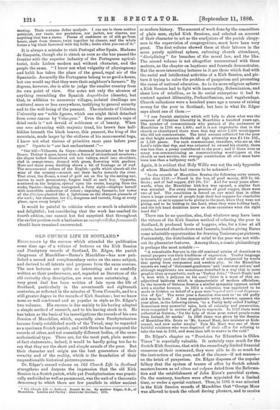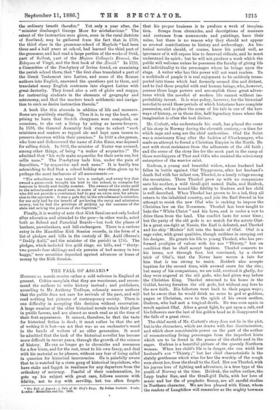OLD CHI7RCH LIFE IN SCOTLAND.*
ENCOURAGED by the success which attended the publication some time ago of a volume of lectures on the Kirk Session and Presbytery records of Scotland, Dr. Edgar, the parish clergyman of Manchline—Bnnis's Mauchline—has now pub- lished a second and complementary series on the same subject, and derived to all intents and purposes from the same sources. The new lectures are quite as interesting and as carefully written as their predecessors, and, regarded as literature of the old.curiosity shop description, are even more entertaining. A very great deal has been written of late upon the life of Scotland, particularly in the seventeenth and eighteenth centuries, as reflected in the minutes of Town Councils, and to a still greater degree in the records of Kirk Sessions ; but we know none so well condensed and so popular in style as Dr. Edgar's two volumes. His success is due mainly to his having adopted a simple method of research, and to his having stack to it. He has taken as the basis of his investigations the records of his own Session of Mauchline, which, especially since Presbyterianism became firmly established north of the Tweed, may be regarded as a specimen Scotch parish ; and with these he has compared the records of other, and not essentially different bodies, of the same ecclesiastical type. These are, for the most part, plain matter- of-fact statements ; indeed, it would be hardly going too far to say that they are the short and simple annals of the poor. Bat their character and origin are the best guarantees of their veracity and of the reality, which is the foundation of their unquestionable historical picturesqueness.
Dr. Edgar's second volume on Old Church Life in Scotland strengthens and deepens the impression that the old Kirk Session in a Scotch parish, while yet Presbyterianism was practi- cally undivided as well as paramount, was the unit of a theocratic democracy to which there are few parallels in either ancient
• Old Church Life in Scotland. Second Be its. By Andrew Edgar, D.D., of Mauchline. London and Paisley : Alexander Gardner. 1830.
or modern history. The amount of work done by the committees of plain men, styled Kirk Sessions, and selected on account of iheir character to act as the coadjutors of the parish clergy- men in the supervision of congregations, must have been very great. The first volume showed them at their labours in the more purely spiritual sphere, enforcing church attendance, " disciplining " for breaches of the moral law, and the like. The second volume is not altogether unconcerned with these matters, as the chapter on baptisms and funerals demonstrates. But the more interesting lectures in it are those which deal with the social and intellectual activities of a Kirk Session, and pic- ture it trying to solve the problem of pauperism and promoting the cause of national education. As iu its more religions spheres a Kirk Session had to fight with immorality, Bohemianism, and sheer love of rebellion, so in its social enterprises it had to contend against illiberality, Pecksniffianism, and vagabondage. Church collections were a hundred years ago a means of raising money for the poor in Scotland ; but here is what Dr. Edgar says about one of them :-
" I can furnish statistics which will help to show what was the measure of Christian liberality in Mauchline a hundred years ago. The number of communicants who partook of the sacrament at Manchline in 1783 was 1,400; and it is not improbable that in the church or churchyard there were that day other 1,400 worshippers who did not communicate. The total amount collected for the poor on that bright autumn Sabbath of high solemnity was £114a. 10d., or 1,138 pence. For each communicant, therefore, who sat at the Lord's table that day, and was exhorted to extend his charity, there was lees than a penny contributed to the poor ; and if there were as many non-communicating as communicating worshippers at the church or tent service, the average contribution all over must have been less than a halfpenny each.'
Again, it is evident that Holy Willie was not the only hypocrite of whom Mauchline had reason to be ashamed :-
" In the records of Manchline Session the following entry occurs,
under date 1748 Found in the box, of good money, £66 7s. 6d. Scots ; and of bad copper, £43 19s. 7d.' And for many years after- wards, when the Manchline kirk-box was opened, a similar fact was revealed. For every three pennies of good copper, there were two of bad. The conclusion is forced on our mind that in olden times a large number of people kept their bad coppers for charitable purposes, so as to appear to be giving to the poor, when they were not giving, and to be lending to the Lord, when they were holding back, and the left hand doubtless knew on these occasions what the right hand did."
There can be no question, also, that whatever may have been the virtues of the Kirk Session method of relieving the poor in Scotland, it produced hosts of beggars, who, for a time at all events, haunted church-doors and funerals, besides giving Burns some admirable opportunities for drawing Teniersesque pictures. Fortunately, the distribution of relief to the poor was not with- out its pleasanter features. Among these, a comic philanthropy is perhaps the most notable :—
" A remarkable feature in the old sessional entries of donations to casual paupers was their kindliness of expression. Tender language is invariably used, and the objects of relief are designated by words that spring from compassion and awaken pity. In the Mauchline records we read of 'distressed gentlemen' and castaway sailors,' and although supplicants are sometimes described in a way that is more graphic than sympathetic, such as ' Turkey John,' `Dumb Hugh,' and ' a man with a polypus on his nose,' there is a want of that un- adjectived baldness which is characteristic of modern officialism. In the records of Galston Session a similar sympathy appears united with a similar humour. In 1672 a collection was appointed to be made in Galston on behalf of a poor man trysted with a sad dispensa- tion of fyr.' The same year a donation was sent to an old godly sick roan in Lorn.' A less sympathetic entry, however, appears the year after, in the following terms, 'to a Paslay body called Findlay.' Sometimes very sorrowful tales both of calamity and persecution, were comprised in entries of -gifts to vagrants. In 1642 there were collected at Galston, for the help of those poor, naked people come from Ireland, 50 marks.' In 1686 there was given by the Session of Mauchline 30s. Scots to Mr. Samuel Muet, lato minister at Kirk- cootie!, and now under straits.' This Mr. Must was one of those faithful ministers who were deprived of their office for refusing to take the test in 1681, and were then left to starve in the cold."
Dr. Edgar's chapter on "Provision for Education in Olden Times " is especially valuable. It certainly says much for the Scotch Kirk Sessions, that with the exceedingly limited financial resources at their command, they were able to do so much for the instruction of the poor, and of the classes—if not masses— on the brink of pauperism. Dr. Edgar disposes of the popular fallacy that the system of tenure of office by Scotch school. masters known as ad titan ant culpam dated from the Reforma- tion and the establishment of John Knox's parochial system. On the contrary, teachers were often appointed for a limited time, or under a special contract. Thus, in 1685 it was minuted in the Kirk Session records of Manchline that "George Moor was allowed to teach the school during pleasure, and to receive the ordinary benefit therefor." Yet only a year after, the "minister discharged George Moor for misbehaviour." The extent of the instruction once given, even in the rural districts of Scotland; may be gathered from the fact that in 1709, the third class in the grammar-school of Maybole "had been three and a half years at school, had learned the third part of the grammar, and had read a large portion of the works of Ovid, part of Sanest, part of the Majors Colloquia Erasnai, the Eclogues of Virgil, and the first book of the .Enid." In 1729, a Committee of the Presbytery of Irvine found, on examining the parish school there, that " the first class translated a part of the Greek Testament into Latine, and some of the Roman authors into English, answered the questions put to them, and translated many English sentences into elegant Latine with great dexterity. They found also a sett of globs and mapps, for instructing students in the elements of geography and astronomy, and that the masters teach arithmetic and naviga- tion to such as desire instruction therein."
A book like this abounds in oddities 'of life and manners. Some are positively startling. Thus it is, to say the least, sur- prising to learn that Scotch clergymen were compelled, on occasions, to eke out a living by acting as tavern-keepers. In 1576, the General Assembly took steps to exhort "such ministers and readers as tapped ale and kept open tavern to preserve decorum within their premises." In 1649 a clergyman, who bore and dishonoured the name of John Knox, was deposed for selling drink. In 1603, the minister of Yester was accused, among other things, of being "a maker of acquavitas !" He admitted that " his wyfe maks acqaavitm for their awin use, but sellis name." The Presbytery bade him, under the pain of deposition, "by acquavitm and mak mane." It is hardly less astonishing to find that a school holiday was often given up to perhaps the most barbarous of all amusements :—
"The schoolroom was turned into a cockpit, and every buy that owned a game-cock brought his bird to the school, to compete for honours in bloody and deadly combat. The owners of the cooks paid to the schoolmaster a small sum, in name of entry-money, and those who did not provide a combatant had to pay an extra sum for admis- sion to the spectacle. It was a gala day in the schoolmaster's calendar, for not only had he the benefit of pocketing the entry and admission money, bat be had the privilege of picking up the carcases of the slain and seizing the persons of the fugitives."
Finally, it is worthy of note that Kirk Sessions not only looked after education and attended to the poor—in other words, acted both as School and Parochial Boards—but took the places of bankers, pawnbrokers, and bill-exchangers. There is a curious entry in the Manchline Kirk Session records, in the form of a list of pledges and bills in the custody of Mr. Auld (Barns's "Daddy Auld," and the minister of the parish) in 1745. The pledges, which included five gold rings, six bills, and " thirty- two pounds four shillings and six pennies of bad money in two baggs," were securities deposited against advances or loans of money by the Kirk Session.



































 Previous page
Previous page